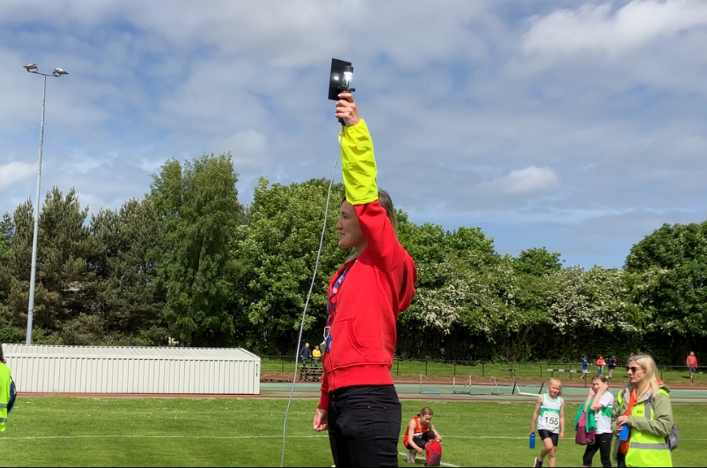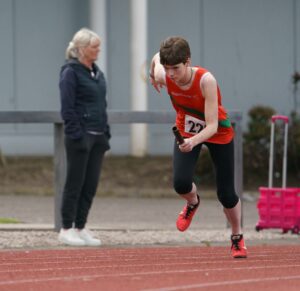The move to electronic start equipment – Eilidh shares her story

Above: Electronic starting system in use at this year’s SUPERteams regional heat at Saughton Track, Edinburgh
The transition towards using electronic starting equipment continues across athletics in Scotland, with a range of benefits over the use of traditional start guns – there’s a cost saving for starting officials, and the move also aids in the recruitment of new officials, who no longer need a firearms licence.
There are also benefits for some athletes and spectators – for those who struggle with loud noises, traditional start guns can be incredibly difficult to tolerate. Below, young athlete Eilidh Scobbie shares with us her own experience, explaining how the use of start guns can in some cases prevent athletes from wanting to compete at all.
Scottish starts
Head of Competition for scottishathletics, Alasdair Love, says: ‘At present, scottishathletics has one full TESS (The Electronic Start System), which is used at our main championships, with another six basic entry level systems loaned out to starters in the East, West and North of Scotland. This allows its use at matches up and down the country.
‘In addition to our track systems, we also have developed an electronic start system for off track events with a slightly adjusted start signal – a longer sound rather than the crisp signal for track & field events. There are three of these systems with one in the East, North and West District areas.
‘In partnership with Aberdeen AAC, Shetland AAC, Cumbernauld AAC, Ayr Seaforth AAC and Nithsdale AC, we have also recently purchased a further five basic systems, which will be owned and operated by the clubs.
‘This will fill an identified gap when one of the custodians of the scottishathletics systems is not available. We have acted upon feedback from timekeeping officials around the flash, and have rolled out an improved starting actuator for all 13 systems over summer 2023.”
Eilidh’s story
Athletics is huge. I’m just one of millions who partakes in track, and I have grown to love it. But I have a problem which massively impacts my enjoyment of the sport, my ability to compete and how I feel about myself as a result of this. I am very sensitive to sudden loud noises.
This is something I have absolutely no control over and that I can’t change. I have lived with this my whole life.
I started athletics in 2015 and competed for the first time in 2017. But after just one competition I was left feeling embarrassed, worthless and overall terrible about myself.
It took over four years for my coach to convince me to give it another go. And even then, when I was able to compete with only a few bumps in the road I felt rubbish about myself when it was all over.
All of this was caused by one thing: the use of a real gun to start races or to signal false starts.
There’s nothing more frustrating than developing an extreme passion for something, doing everything in your power and working tirelessly to improve, but then feeling incapable of simply going out and taking part in competition. And I know for a fact that I’m not the only person who feels this way.
Many people can find sudden unexpected loud noises frightening, if you were to walk into a room with ten people in it and pop a balloon, chances are most of the ten people will have some form of reaction to the noise, because it’s completely natural.
All humans are born with two fears: the fear of heights and the fear of loud noises, but most people learn that these things can’t actually hurt them, even if they may still have a reaction to them, but this reaction is taken to a whole other level if you experience any form of sensitivity (hyperacusis) or phobia of noise (phonophobia, also known as ligyrophobia, sonophobia or acousticophobia).
Sudden loud noises can also trigger instinctive and significantly exaggerated responses in individuals with PTSD (post-traumatic stress disorder), because for them that sound is linked to danger and activates a fight or flight response as a defence mechanism to protect themselves from danger. Being affected by any of these conditions can make it nearly impossible for the affected individual to compete properly.
For four years I watched everyone else, competing, achieving new personal bests and breaking club records, whilst all I could do was keep training and try to ignore the feelings of frustration at not being able to do the same. All because I simply can’t deal with the starting gun.
As a direct result of my sensitivity to noise I have also developed a phobia of sudden loud noises. This leads to me purposely avoiding situations in which there may be triggering sounds, including athletics competitions. Another impact of this phobia on my experience with competing, is when there is a real gun used, I may experience anxiety attacks and be unable to go ahead with the race. If I do manage to pick myself back up and race it is with a massive hit to any confidence I may have been able to build before the race and can seriously affect my ability to perform well and how I feel after it’s all over.
In the last year I have been competing some more, but nowhere near what I want to be able to do. Every time I sign up for a competition, I feel my anxiety start to build and build, but all I can do is wait it out and see what the situation with the guns is on the day.
Through the six competitions I have done in the last year, I had to deal with a real gun at three of them – twice as a starting gun and once as a false start gun.
Whilst most people are aware that the start gun is loud, they might not really consider just how little it can take to damage your hearing. Any noise over 85dB can cause damage if exposed for an extended period of time (over 8 hours). For reference a normal conversation can average between 60-70dB, a fireworks display averages around 120dB and a balloon popping can range from anywhere between 140-168dB depending on how it is popped. A starting gun is approximately 140dB, this is where most people will start to experience pain.
The risk to athletes and spectators is generally lower with the volume being closer to 100dB, but this can still contribute to their overall noise exposure. This can be made worse if there is a gun being used to signal false starts or a final lap, where the official may be positioned much closer to the athletes than when starting the race. Many standardised measurements of sound pressure caused by firing start guns can be inconsistent as anything from model, ammunition type, barrel length and muzzle brakes or ports can affect the volume of the gun.
Firing blanks isn’t only known to have harmed people in sports as there are multiple reports of actors who have suffered acoustic trauma from firing blanks during movie production, including former US President and actor Ronald Reagan who suffered hearing damage after firing blanks without hearing protection whilst filming.
Guns don’t only pose risk to hearing but also physical injury. Start guns are incapable of firing projectiles due to having a blocked barrel, however the force from firing blanks can still be violent.
Why choose to accept all of the risks associated with starting guns when there are much safer and quieter alternatives?
All major competitions use electronic guns now, so why not make it a standard that has to be met in order to safely host an event? Why put yourself and the athletes at risk when there is absolutely no need for this?
The use of electronic systems is not only cheaper in the long run, due to not needing to purchase blanks, but also makes the starting sound much more bearable allowing other people like me to compete without needing to worry about being affected by something we are unable to control.
– By Eilidh Scobbie
Tags: Electronic start systems
Latest Articles
International


Latest Facebook update
Problem displaying Facebook posts. Backup cache in use.
Click to show error